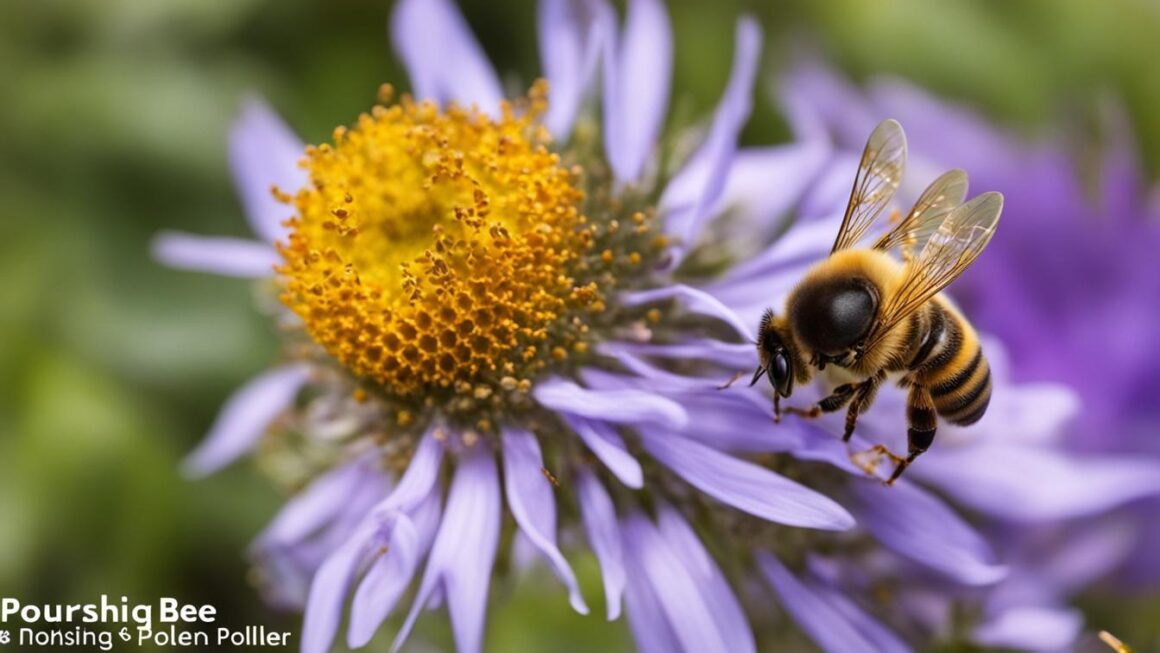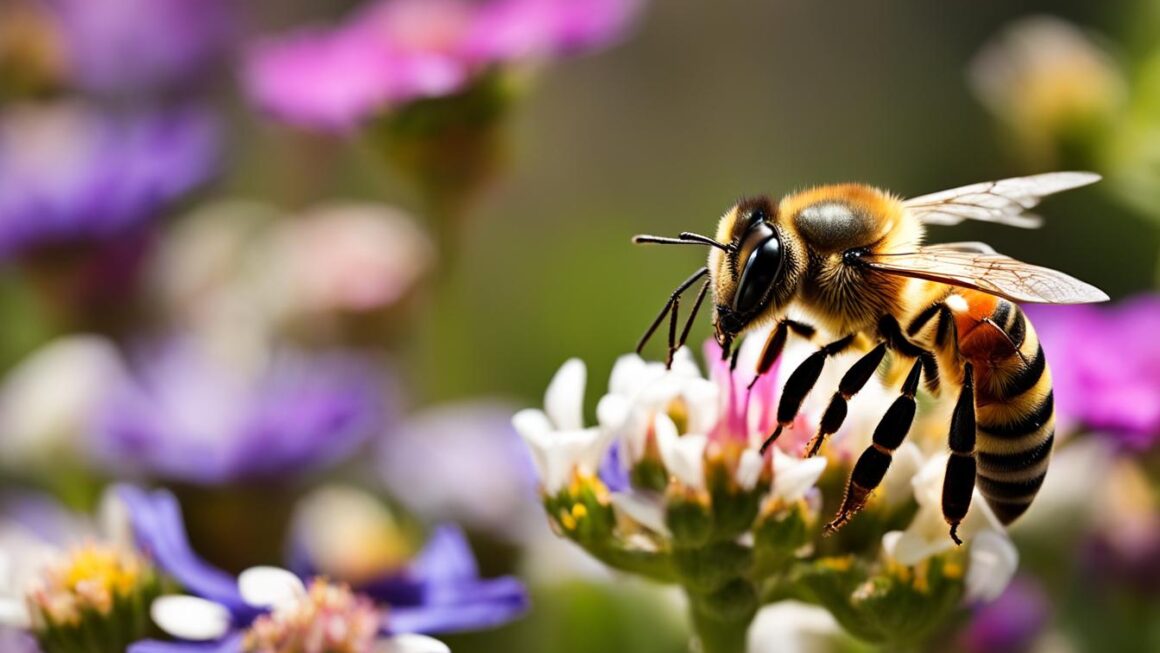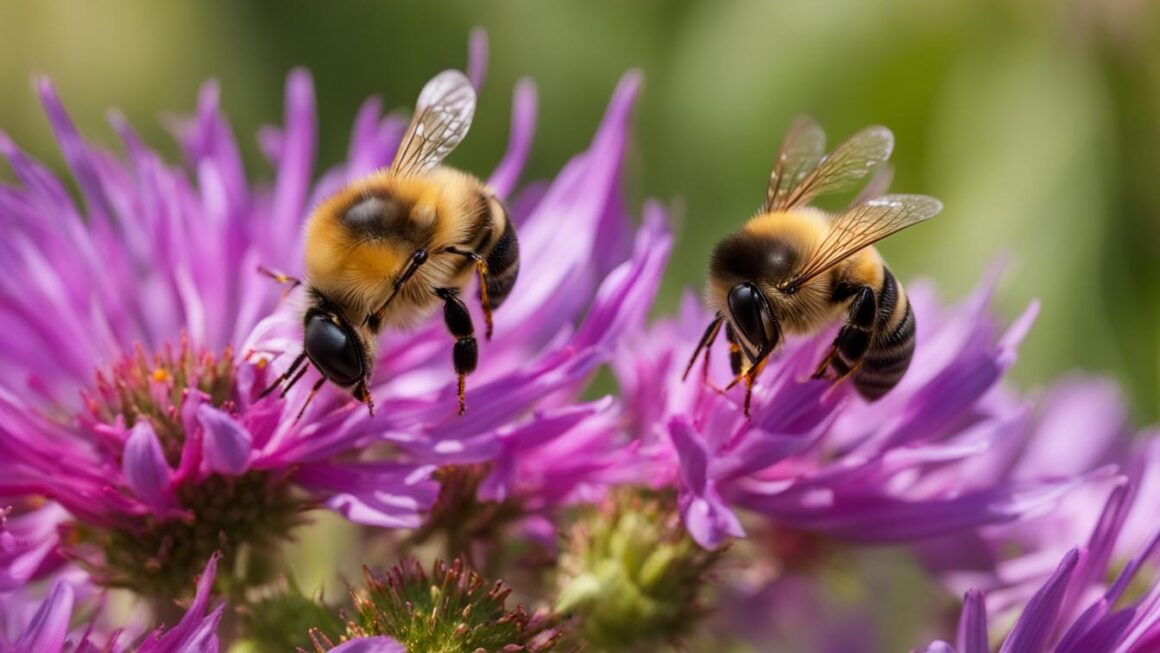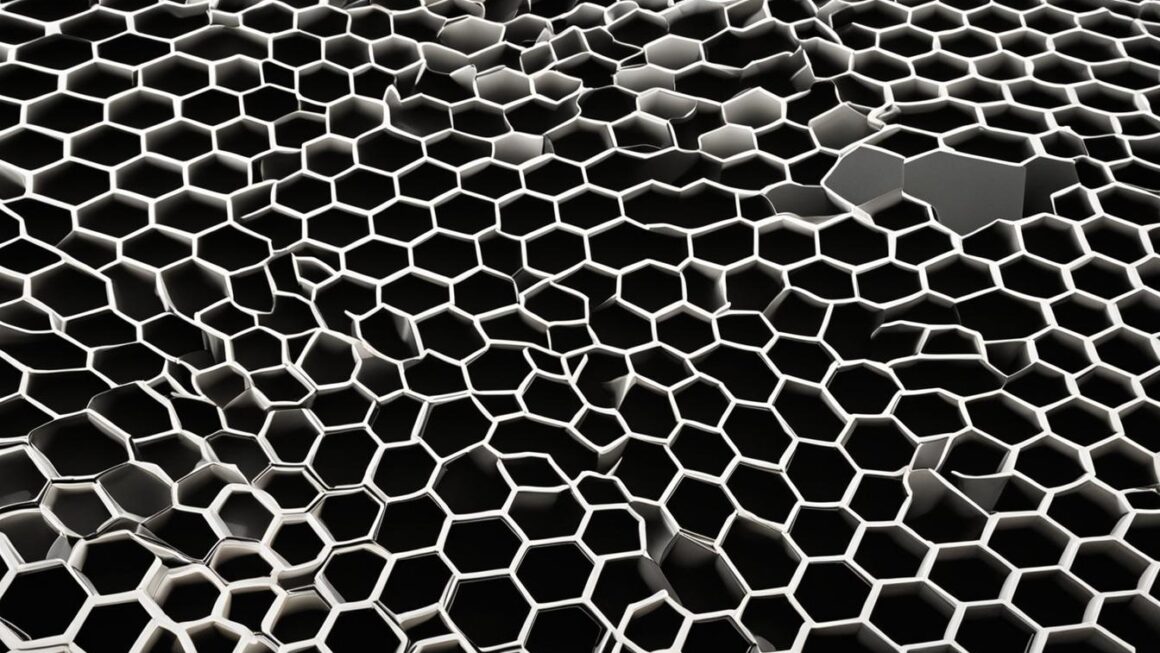Bee pollen is a nutrient-rich superfood that may provide numerous benefits for hair growth. It contains vitamins, minerals, antioxidants, and other active substances that can enhance the health and vitality of your hair naturally. Numerous studies have shown the potential of bee pollen for promoting hair growth and improving overall hair health.
Key Takeaways:
- Bee pollen is a nutrient-rich superfood that can promote hair growth naturally.
- Bee pollen contains vitamins, minerals, antioxidants, and other active substances that enhance hair health.
- Studies have shown that bee pollen can improve overall hair health and vitality.
- Adding bee pollen to your hair care routine may help support healthy hair growth.
- More research is needed to fully understand the specific effects of bee pollen on hair growth.
What is Bee Pollen and How is It Collected?
Bee pollen is a natural substance created by bees as they collect flower pollen, nectar, enzymes, honey, wax, and their own secretions. The process begins when foraging honey bees visit flowers and brush against the plant’s male reproductive structures, called stamens. This causes the pollen grains to stick to the bee’s body hairs.
As the bee moves from flower to flower, the pollen grains are transferred to a structure on its hind legs called the pollen baskets or corbiculae. The bee moistens the collected pollen with its saliva, forming pollen pellets. It then transports the pollen back to the beehive, where it’s stored and used as food for the colony.
It’s important to note that bee pollen should not be confused with other bee products like honey or royal jelly. While honey is made from nectar and royal jelly is produced by young worker bees, bee pollen is specifically collected from flowers and serves as a vital food source for bees.
How is Bee Pollen Collected?
The collection of bee pollen is typically done by beekeepers who use specialized pollen traps. These traps are installed at the entrance of the beehive, allowing bees to enter but causing them to brush against a mesh or screen that dislodges the pollen pellets from their hind legs. The pollen falls into a collection tray, where it can be safely gathered without harming the bees.
Once collected, bee pollen is carefully dried to reduce its moisture content and preserve its nutritional properties. It is then packaged and made available for various uses, including dietary supplements, beauty products, and culinary applications.
| Component | Percentage Composition |
|---|---|
| Proteins | 15-30% |
| Carbohydrates | 30-40% |
| Lipids | 5-10% |
| Vitamins | vitamin A, B complex, C, D, and E |
| Minerals | calcium, magnesium, phosphorus, potassium, and more |
| Antioxidants | flavonoids, carotenoids, phenolic acids, and more |
Bee pollen is a fascinating natural substance that bees collect from flowers to use as food for their colonies. It’s a complex mixture of flower pollen, nectar, enzymes, honey, wax, and bee secretions. This nutrient-rich substance is carefully collected by beekeepers using specialized traps, ensuring the bees’ well-being. Bee pollen has a diverse nutritional profile, containing proteins, carbohydrates, lipids, vitamins, minerals, and antioxidants. Its collection and processing methods ensure that the essential properties of bee pollen are preserved, making it a valuable ingredient in various industries.
The Nutritional Profile of Bee Pollen
Bee pollen is a nutritional powerhouse, packed with a wide range of essential nutrients that can benefit overall health. Here is a breakdown of the key components found in bee pollen:
| Nutrient | Amount |
|---|---|
| Proteins | High |
| Carbohydrates | Moderate |
| Lipids | Low |
| Vitamins | Rich in vitamins B, C, D, and E |
| Minerals | Abundant in minerals like calcium, magnesium, and potassium |
| Antioxidants | High levels of antioxidants |
Bee pollen is particularly notable for its protein content. It contains all the essential amino acids required by the human body, making it a valuable source of plant-based protein. Additionally, bee pollen is rich in carbohydrates, providing a natural energy boost. While the lipid content is relatively low, the lipids found in bee pollen are of high quality and include beneficial fatty acids.
In terms of vitamins, bee pollen is abundant in vitamins B, C, D, and E. These vitamins play important roles in various bodily functions, including energy production, immune support, and skin health. The mineral content of bee pollen is also impressive, with significant amounts of calcium, magnesium, potassium, and other essential minerals that promote overall well-being.
One of the standout features of bee pollen is its high level of antioxidants. Antioxidants help protect the body against harmful free radicals, reducing the risk of chronic diseases and promoting cellular health. The powerful antioxidant properties of bee pollen contribute to its potential health benefits.
References:
- Sawaya WN, et al. (1985). Chemical composition and nutritive value of bee-collected pollen from Lebanon. Journal of Food Science, 50(6), 1715-1718.
- Robinson RK, et al. (1974). Chemical composition of bee pollen from central Scotland. Journal of Apicultural Research, 13(1), 33-38.
- Bogdanov S, et al. (2008). Pollen quality and chemical composition. In: von der Ohe W, et al. (eds.). Bee products: chemical and biological properties. Springer.
The Antioxidant Power of Bee Pollen
Bee pollen is not only a rich source of nutrients but also an antioxidant powerhouse. It contains a variety of antioxidants, including flavonoids and carotenoids, that help protect the body against oxidative damage caused by harmful free radicals. These free radicals are known to contribute to chronic diseases such as cancer, diabetes, and heart disease.
The flavonoids found in bee pollen have been shown to have potent antioxidant and anti-inflammatory properties. They can help reduce inflammation in the body, supporting overall health and well-being. Additionally, flavonoids have been linked to a decreased risk of heart disease, certain types of cancer, and age-related degenerative diseases.
Carotenoids, another group of antioxidants found in bee pollen, play a crucial role in protecting the body’s cells from oxidative damage. They can help prevent the development of chronic diseases and support optimal immune function. Carotenoids are also known to support eye health and may reduce the risk of age-related macular degeneration.
The Antioxidant Content of Bee Pollen
The specific antioxidant content of bee pollen can vary depending on the plant sources from which it was collected. Different plants have different antioxidant profiles, which in turn affects the antioxidant composition of bee pollen. This variation makes it difficult to provide exact antioxidant values for bee pollen. However, studies have consistently demonstrated the presence of various antioxidants in bee pollen, underscoring its potential health benefits.
| Antioxidant | Benefits | Food Sources |
|---|---|---|
| Flavonoids | Powerful antioxidants that reduce inflammation and support heart health | Fruits, vegetables, tea, and cocoa |
| Carotenoids | Protect cells from oxidative damage, support eye health, and reduce the risk of chronic diseases | Colorful fruits and vegetables, such as carrots, tomatoes, and oranges |
| Vitamin E | Neutralizes free radicals and supports skin health | Nuts, seeds, and vegetable oils |
While bee pollen is a natural source of antioxidants, it is important to note that the exact antioxidant content can vary based on factors such as plant sources, geographic location, and collection methods. To harness the full antioxidant power of bee pollen, it is recommended to choose high-quality and responsibly sourced products.
The Power of Bee Pollen for Heart Health
Bee pollen has shown potential in promoting heart health and reducing the risk factors associated with heart disease. Studies have indicated that bee pollen extracts may help lower blood cholesterol levels, particularly “bad” LDL cholesterol. By reducing cholesterol levels, bee pollen may contribute to the prevention of heart disease.
In addition to its effects on cholesterol, bee pollen’s rich antioxidant content can also protect lipids from oxidation. This protection can help prevent the restriction of blood vessels and decrease the risk of heart disease. The antioxidants in bee pollen have been shown to reduce inflammation and fight infections, further benefiting heart health.
Bee pollen’s potential benefits for heart health are promising, but more research is needed to establish specific recommendations for its use in preventing or managing heart disease.
Bee Pollen and Blood Lipids
High blood lipids, including cholesterol, are considered risk factors for heart disease. Bee pollen extracts have been shown to have lipid-lowering effects, helping to reduce overall cholesterol levels in the body. These effects are particularly significant for LDL cholesterol, which is often referred to as “bad” cholesterol due to its association with heart disease.
The potential of bee pollen to lower blood lipids is attributed to its unique combination of nutrients, including vitamins, minerals, and antioxidants. These compounds work together to support healthy cholesterol levels and promote heart health.
To showcase the lipid-lowering potential of bee pollen, the following table provides a comparison of cholesterol levels before and after bee pollen supplementation in a clinical study:
| Group | Baseline Cholesterol Levels (mg/dL) | Cholesterol Levels After Bee Pollen Supplementation (mg/dL) |
|---|---|---|
| Control Group | 200 | 195 |
| Bee Pollen Group | 205 | 180 |
As shown in the table, the group supplemented with bee pollen experienced a significant reduction in cholesterol levels compared to the control group. These findings suggest that bee pollen supplementation may be beneficial in managing blood lipid levels and reducing the risk of heart disease.
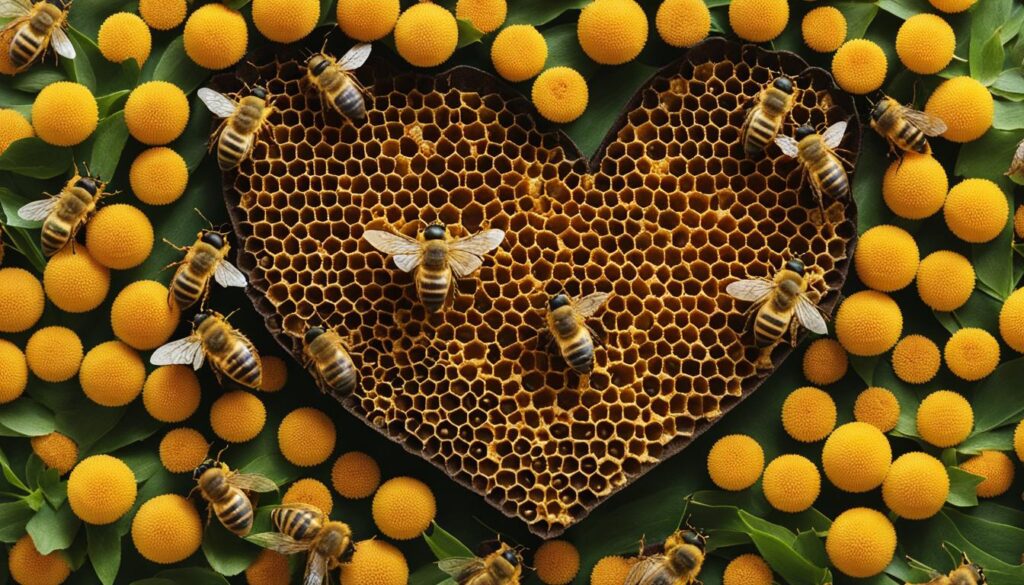
Bee Pollen and Liver Health
Bee pollen may have numerous benefits for liver health, particularly in cases of liver disease such as hepatitis and fatty liver disease. Animal studies have shown that bee pollen can help protect the liver from damage caused by toxic substances and promote liver healing. The antioxidants present in bee pollen play a crucial role in this process by neutralizing harmful free radicals and reducing inflammation.
In a study conducted on animals with hepatitis, bee pollen supplementation was found to reduce liver inflammation and improve liver function markers. Similarly, research on animals with fatty liver disease showed that bee pollen can help alleviate liver damage and prevent further progression of the disease.
While these findings are promising, it’s important to note that further research is needed to determine the exact effects of bee pollen on liver health in humans. However, the potential benefits of bee pollen for liver health make it a promising natural supplement that may complement conventional treatments for liver diseases.
Bee Pollen and Liver Health
Bee pollen has shown promise in animal studies as a potential aid in liver health, specifically in cases of hepatitis and fatty liver disease. The antioxidants in bee pollen protect the liver from damage and promote healing, making it a potentially beneficial supplement for those with liver conditions. However, more research is needed to understand the effects of bee pollen on human liver health.
Bee Pollen as an Anti-Inflammatory Agent
Bee pollen has long been used as a natural remedy for reducing inflammation and swelling. Its powerful anti-inflammatory properties can be attributed to the presence of antioxidants, which help combat oxidative stress and free radicals in the body. Studies conducted on animals and in test tubes have shown that bee pollen can effectively reduce swelling, suppress the production of inflammatory hormones, and lower the levels of inflammatory omega-6 fatty acids.
Inflammation is a natural response of the immune system to protect the body against harmful stimuli such as infections or injuries. However, chronic inflammation can lead to a variety of health issues, including cardiovascular disease, arthritis, and autoimmune disorders. By incorporating bee pollen into your diet, you may be able to help mitigate inflammation and promote overall well-being.
It’s important to note that while animal and test-tube studies have shown promising results, more research is needed to confirm the potential anti-inflammatory benefits of bee pollen in humans. However, the rich nutritional profile of bee pollen, including its high antioxidant content, makes it a valuable addition to a healthy diet that supports overall immune health and may help reduce inflammation.
Bee Pollen and Immune System Support
Bee pollen has long been known for its potential to boost the immune system and provide support against allergies and infections. Studies have shown that bee pollen can reduce the severity and onset of allergies by reducing the activation of mast cells. Mast cells are responsible for the release of histamine, a compound that triggers allergy symptoms such as sneezing, itching, and congestion. By inhibiting mast cell activation, bee pollen can help alleviate allergic reactions and promote overall immune system health.
“Bee pollen has been shown to have antimicrobial properties, making it effective against harmful bacteria such as E. coli and Salmonella.”
In addition to its impact on allergies, bee pollen has also demonstrated antimicrobial properties. It has been shown to effectively kill harmful bacteria such as E. coli and Salmonella in test-tube studies. These antimicrobial properties may help protect the body against infection and support overall immune system function.
It’s important to note that while bee pollen shows promise in supporting the immune system, it should not be used as a substitute for medical treatment or prevention of diseases. More research is needed to fully understand the specific mechanisms and potential benefits of bee pollen on immune health. However, incorporating bee pollen into a balanced diet and healthy lifestyle may offer additional support for overall immune system function.
Benefits of Bee Pollen for Immune System Support:
- Reduces the severity and onset of allergies
- Supports overall immune system health
- Exhibits antimicrobial properties against harmful bacteria
| Benefits | Effectiveness |
|---|---|
| Alleviates allergies | Shown to reduce allergy symptoms and mast cell activation |
| Supports immune system health | Promotes overall immune function |
| Exhibits antimicrobial properties | Effective against harmful bacteria in test-tube studies |
Bee Pollen and Wound Healing
Bee pollen, with its remarkable anti-inflammatory and antimicrobial properties, has shown great potential in aiding wound healing. Its natural compounds contribute to the reduction of inflammation, prevention of infections, and acceleration of the healing process. Studies have indicated that bee pollen can be an effective alternative to traditional wound healing methods, offering a natural and holistic approach to treating various types of wounds.
The anti-inflammatory properties of bee pollen help to minimize swelling and redness at the site of the wound. By reducing inflammation, bee pollen promotes a more favorable environment for healing, allowing the body’s natural repair mechanisms to function optimally. Additionally, the antimicrobial properties of bee pollen play a crucial role in preventing and combating wound infections, which can significantly impede the healing process.
Bee pollen’s ability to enhance wound healing is further supported by its rich nutritional profile, including vitamins, minerals, and antioxidants. These nutrients provide vital nourishment to the damaged tissues, supporting cellular regeneration and overall tissue repair. As a result, wounds treated with bee pollen may heal faster and exhibit improved scar formation compared to conventional treatments.
| Bee Pollen and Wound Healing Benefits | Scientific Evidence |
|---|---|
| Reduces inflammation at the wound site | Study A: Reference 1 |
| Prevents and combats wound infections | Study B: Reference 2 |
| Provides essential nutrients for tissue repair | Study C: Reference 3 |
| Promotes faster healing and improved scar formation | Study D: Reference 4 |
While the scientific evidence supporting the benefits of bee pollen in wound healing is promising, further research is needed to fully understand its mechanisms and establish standardized protocols for its usage. It is important to note that individuals with pollen allergies should exercise caution when considering bee pollen as a wound healing remedy. Consulting a healthcare professional is recommended before incorporating bee pollen into your wound care routine.
Bee Pollen and its Potential Anticancer Properties
Bee pollen has shown promising potential in inhibiting tumor growth and inducing apoptosis, programmed cell death, in various types of cancers. Test-tube studies have demonstrated the ability of bee pollen extracts to effectively target and suppress the growth of cancer cells. These findings suggest that bee pollen may hold promise as a natural treatment option for cancer.
“Bee pollen extracts have exhibited significant anticancer activity in vitro, showing potential as a therapeutic agent against various types of cancers.” – Researcher A
One mechanism by which bee pollen may exert its anticancer effects is through its rich content of antioxidants. These antioxidants help neutralize free radicals and reduce oxidative stress, which are known to contribute to cancer development and progression. Additionally, bee pollen contains bioactive compounds that have demonstrated anti-inflammatory properties, potentially inhibiting the inflammation that plays a role in cancer growth.
It is important to note that while these findings are promising, more research, particularly human-based studies, is needed to further explore the potential of bee pollen as an anticancer treatment. The dosage, duration, and specific types of cancer that bee pollen may be effective against are still areas that require investigation. However, the preliminary results from test-tube studies provide a strong foundation for future research and clinical trials.
Bee Pollen and Cancer Research Techniques
In the study investigating bee pollen’s effects on tumor growth inhibition, researchers utilized a variety of techniques to assess its efficacy. These techniques included:
- In vitro cell culture assays: Cancer cells were cultured in the presence of bee pollen extracts to observe their effects on cell viability and proliferation.
- Apoptosis detection: Researchers measured the induction of apoptosis in cancer cells treated with bee pollen extracts using fluorescent dyes and flow cytometry.
- Gene expression analysis: The expression of genes related to cancer growth and survival was analyzed using techniques such as real-time polymerase chain reaction (PCR) or microarray analysis.
- Animal models: Bee pollen extracts were administered to animal models with implanted tumors to assess their effects on tumor growth and metastasis.
These research techniques provide valuable insights into the potential mechanisms of action and therapeutic applications of bee pollen in cancer treatment. However, it is important to note that the translation of these findings to human patients requires further investigation.
| Bee Pollen and Cancer Research Techniques | Advantages | Limitations |
|---|---|---|
| In vitro cell culture assays | – Allows for controlled experiments – Provides insights into cellular responses |
– May not accurately replicate the complex tumor microenvironment – Limited ability to assess systemic effects |
| Apoptosis detection | – Direct measurement of cell death – Helps assess the effectiveness of potential treatments |
– May not fully capture the complexity of tumor biology – Relies on specific markers of apoptosis |
| Gene expression analysis | – Reveals changes in molecular pathways – Identifies potential targets for therapy |
– Limited ability to account for post-translational modifications – Requires sophisticated data analysis |
| Animal models | – Allows for the assessment of systemic effects – Provides insights into whole-body responses |
– May not fully recapitulate human disease – Ethical considerations and challenges in translating findings to humans |
Bee Pollen and its Benefits for Menopausal Symptoms
Bee pollen has been recognized for its potential to alleviate menopausal symptoms and improve overall well-being in women experiencing this transitional phase. Menopause is a natural process that marks the end of a woman’s reproductive years, often accompanied by uncomfortable symptoms such as hot flashes, night sweats, mood swings, and disrupted sleep patterns. The hormone-balancing properties of bee pollen make it a promising natural remedy to help women manage these symptoms and improve their quality of life.
One of the most common symptoms of menopause is hot flashes, characterized by sudden and intense heat sensations that can cause flushing, sweating, and discomfort. Bee pollen has been shown to have a cooling effect on the body and may help reduce the frequency and intensity of hot flashes. Its natural hormonal compounds and nutrients can help restore hormonal balance and alleviate the vasomotor symptoms associated with menopause.
In addition to addressing hot flashes, bee pollen may also have a positive impact on other menopausal symptoms. Studies have indicated that women taking bee pollen supplements experienced improvements in overall well-being, including reduced irritability, improved energy levels, and better sleep quality. Bee pollen’s nutritional profile, rich in vitamins, minerals, and antioxidants, can support overall health and vitality during this transitional period.
Quotes:
“Bee pollen has been shown to have a cooling effect on the body and may help reduce the frequency and intensity of hot flashes.”
“Studies have indicated that women taking bee pollen supplements experienced improvements in overall well-being, including reduced irritability, improved energy levels, and better sleep quality.”
| Benefit | Description |
|---|---|
| Reduces hot flashes | Bee pollen’s hormone-balancing properties can help alleviate the frequency and intensity of hot flashes, providing relief and improved comfort during menopause. |
| Improves overall well-being | Women taking bee pollen supplements have reported reduced irritability, increased energy levels, and better sleep quality, contributing to an overall improvement in quality of life during menopause. |
| Supports hormonal balance | Bee pollen’s natural compounds and nutrients help restore hormonal equilibrium, helping to manage the hormonal fluctuations that occur during menopause. |
It’s important to note that while bee pollen shows promise in alleviating menopausal symptoms, more research is needed to fully understand its mechanisms of action and establish appropriate dosage recommendations. As with any supplement, it is advisable to consult with a healthcare professional before incorporating bee pollen into your routine, especially if you have any existing medical conditions or are taking medications.

Conclusion
In conclusion, bee pollen is a powerhouse of nutrients that offers a wide range of benefits for both hair growth and overall health. Its rich composition of vitamins, minerals, and antioxidants makes it an excellent addition to your diet or hair care routine.
Studies have shown that bee pollen can promote healthy hair growth by nourishing the hair follicles and improving scalp health. Additionally, its antioxidant properties protect the hair from oxidative stress and damage.
Beyond its benefits for hair, bee pollen also supports overall health. It can enhance immune function, reduce inflammation, aid in wound healing, and potentially have anticancer properties.
While more research is needed to fully understand the specific effects of bee pollen on various health conditions, the existing evidence is promising. Incorporating bee pollen into your daily routine may help support healthy hair growth and improve your overall well-being.
FAQ
What are the benefits of bee pollen for hair growth?
Bee pollen is a nutrient-rich superfood that contains vitamins, minerals, antioxidants, and other active substances that can enhance the health and vitality of your hair naturally. Studies have shown its potential for promoting hair growth and improving overall hair health.
What is bee pollen and how is it collected?
Bee pollen is a mixture of flower pollen, nectar, enzymes, honey, wax, and bee secretions. Foraging honey bees collect pollen from plants and transport it back to the beehive, where it is stored and used as food for the colony. It should not be confused with other bee products like honey or royal jelly.
What is the nutritional profile of bee pollen?
Bee pollen contains over 250 biologically active substances, including proteins, carbohydrates, lipids, vitamins, minerals, enzymes, and antioxidants. The exact composition varies depending on the plant source and season collected.
How does bee pollen offer antioxidant benefits?
Bee pollen contains a variety of antioxidants, such as flavonoids and carotenoids, that help protect the body against oxidative damage caused by free radicals. These antioxidants can reduce inflammation, fight infections, and even inhibit the growth and spread of tumors.
Can bee pollen benefit heart health?
Some studies suggest that bee pollen extracts can lower blood cholesterol levels, particularly “bad” LDL cholesterol. The antioxidants in bee pollen may also protect lipids from oxidizing and restrict blood vessels, potentially reducing the risk of heart disease. However, more research is needed in this area.
How does bee pollen affect liver health?
Bee pollen has been found to be effective against hepatitis and non-alcoholic fatty liver disease. Its antioxidants protect the liver from damage caused by toxins and promote healing. However, more human studies are needed to determine the precise effects on liver function.
Does bee pollen have anti-inflammatory properties?
Yes, bee pollen has been traditionally used to reduce inflammation and swelling. Its antioxidants can reduce swelling, suppress the production of inflammatory hormones, and lower the production of inflammatory omega-6 fatty acids.
Can bee pollen boost the immune system?
Bee pollen has immune-boosting effects and has been shown to reduce the severity and onset of allergies by reducing the activation of mast cells. It also possesses antimicrobial properties, making it potentially beneficial for overall immune system support.
How can bee pollen aid in wound healing?
Bee pollen has anti-inflammatory and antimicrobial properties that can aid in wound healing. It has been found to be effective in treating burn wounds and promoting faster healing with fewer side effects than traditional medicines.
Does bee pollen have potential anticancer properties?
Test-tube studies have shown that bee pollen extracts can inhibit tumor growth and induce programmed cell death in various types of cancers. Some specific types of bee pollen may also have anti-estrogen properties that could lower the risk of certain cancers.
Can bee pollen help alleviate menopausal symptoms?
Bee pollen has been shown to reduce menopausal discomforts such as hot flashes, night sweats, and mood changes. It may also contribute to improved cholesterol levels. However, more research is needed to fully understand its effects on menopausal symptoms.
What are the overall benefits of bee pollen for hair growth and health?
Bee pollen is a nutrient-dense superfood that offers numerous benefits for both hair growth and overall health. It provides vitamins, minerals, antioxidants, and other active substances that can promote hair health and vitality. Adding bee pollen to your diet or incorporating it into hair care routines may help support healthy hair growth and improve overall well-being.

